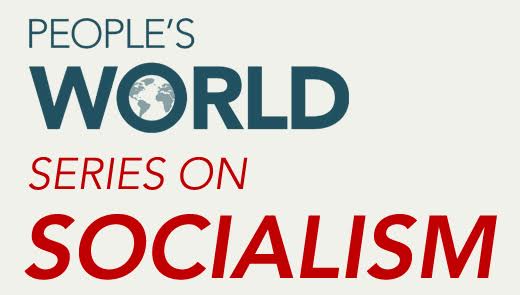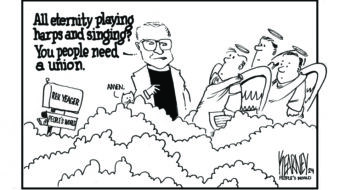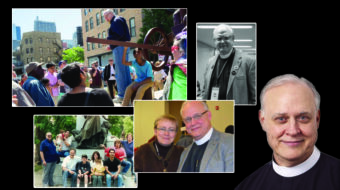
People’s World Series on Socialism
Everyone seems to be talking about socialism these days, but what does it mean? That was the question asked by Susan Webb in one of our most popular and widely-shared recent articles. Millions of Americans are considering alternatives to a system run by and for the 1 percent. They are taking an interest in socialism, a word that has meant a great many things to activists, trade unionists, politicians, and clergy around the world over the last century and a half. The article below is one of a series on socialism, what it can mean for Americans in the 21st century, and how we might get there. Other articles in the series can be found here.
“Religious suffering is, at one and the same time, the expression of real suffering and a protest against real suffering.”
How’s that for a neat dialectical summation? It’s almost a Buddhist koan, a seeming paradox that points to a larger truth. Well, you shouldn’t be surprised. It’s from Karl Marx himself, the – dare I say it? – high priest of dialectics and historical materialism. He then goes on to say, in words that will likely be more familiar:
“Religion is the sigh of the oppressed creature, the heart of a heartless world, and the soul of soulless conditions. It is the opium of the people.”
Marxists (and don’t forget Marx claimed he was not a Marxist!) have forever interpreted that last phrase as if he were depicting 19th-century Chinese opium dens (supplied by British commercial and colonial interests, natch). It’s important to remember that opium in the 19th century – as in the 21st – was a commonly used medical substance for pain relief, not necessarily and not only the addiction that led to a person’s disengagement from life and struggle.
It would be cruel indeed to ignore the sentence that precedes “opium.” Religion can provide context, comfort, and hope in a world that, at least up to now, cannot provide all the conditions for decent and contented life. We cannot grind people into the dirt and then propose to take away from them their meager crutch of understanding.
Ah, but that’s where we have to introduce socialist ideology, you say, to bring consciousness to the masses. To replace foolish superstition with real knowledge of the workings of the material world. Education! Science! Actually, Marx beat you to that part, but more poetically and with a larger appreciation for the process and the stages by which such transformation might occur. He goes on in the next breath to say:
“The abolition of religion as the illusory happiness of the people is the demand for their real happiness. To call on them to give up their illusions about their condition is to call on them to give up a condition that requires illusions. The criticism of religion is, therefore, in embryo, the criticism of that vale of tears of which religion is the halo.”
At many critical junctures in history, religious expression has exerted a powerful influence in advancing the human condition. The Bible exhorts us time and again to “remember the stranger for you were once slaves in Egypt.” The egalitarian message of Jesus has animated millions of believers. The Protestant Reformation unleashed the vast creative forces of modernity and skeptical thinking that accompanied the passing of feudalism and the rise of capitalism.
In modern times, the Civil Rights movement recruited untold numbers of churchgoers and believers and lifted up dynamic preachers of the Word to national prominence. Their inherent “criticism of religion” – the religion not only of the KKK but also of the complacent mainstream – surely was the embryo of a new form of life out of that “vale of tears.”
We cannot speak only of Western religious traditions, of course. In many indigenous cultures, there is not even a fine line between “religion” and culture. In our country, Native beliefs about the unity and continuity of all life and natural forms sit at the heart of their environmental concerns; many non-Natives have come to appreciate and adopt that point of view. We would be ill-advised to erase such “religious” convictions from our “socialist” program.
Today, faith-based groups in churches, synagogues, and mosques vigorously address issues of labor, racism, civil rights, the environment, women’s and LGBTQ rights, foreign policy, militarism, and other concerns affecting legislation, public policy, and popular consciousness. It is unfair in the extreme to paint all of religion with the right-wing brush that some sects – perceived as ever more bizarre – have earned with their backward policies on women, reproductive rights, LGBTQ issues, creationism, etc.
If socialism is the evolving practice of the most humane and effective solutions to human and environmental problems in the people’s ongoing “demand for their real happiness,” then clearly religious folk can have a say in that evolution. Transition is always uneven, sometimes lagging, sometimes bounding ahead, and not everyone, whether religious or not, can be at a single evolutionary point at the same moment.
In different times and places, and among certain demographic communities, perhaps socialist thinking will wholly supplant religious “illusions,” but we cannot expect sustained success at this project in a most uncertain world. We must have some appreciation for differences in the broader coalition building socialist consciousness. After all, even on the nonreligious left we have always had serious differences of views. We must show some humility on this point, and even contrition. The “socialism” we have seen in the world has often fallen woefully short of the “real happiness” of which Marx speaks.
There cannot be many socialist movements in the world today that are avowedly, militantly atheist. Those days are over.
I was on a peace activist trip to the USSR in 1980 with Quakers, pacifists, ministers and church people, anarchists, socialists of one variety or another, and Communist Party members as well. We made a point of visiting churches and synagogues, speaking as frankly as we could with their leaders, and attending religious services in several cities. Atheism may have been the declared policy of the state, but by no means was religion outlawed or invisible. Its reach was controlled, however, and often believers were charged with other crimes (such as “Zionism” for wanting to study Hebrew). For the most part churches simply had to be self-supporting. Other socialist societies today have active churches – in Cuba, Vietnam, Laos, China – for those who are interested. (Perhaps North Korea would be an exception; I’m not sure what the situation is there, but they certainly do not appreciate Western proselytizing.)
We have to admit that the socialist countries generally had a poor record on civil liberties, including freedom of religion. While various external and internal circumstances – the transition from, in some cases, virtual feudalism to 20th-century socialism, and above all, of course, the relentless hostility of imperialism – undoubtedly played a role in this, these did not completely explain the repressiveness which became, finally, a significant factor in the collapse of socialism. Socialists today will not follow their example.
However, we cannot leave it at that. Many of the things people worry about in life which once required the “opium” of their “illusions” – such as joblessness, poverty, illiteracy, illness and poor healthcare, racial and religious prejudice, inadequate housing, war, crime, and environmental degradation – were indeed greatly minimized in the socialist world. So whether by formal decree, or by the withdrawal of public support for state-approved religion, or by natural attrition, the status of religion did decline, as people’s material needs were being fulfilled in real life.
This is indeed what we see in the advanced nations of Western Europe today, which are very largely secular societies, because many of them are social democratic, if not actually socialist. By any measure their “real happiness” far surpasses what we see in the United States, for example, which continues its path toward gross inequality of wealth and of opportunity.
Yet even here the percentage of “nones” – those who profess no religion – grows year by year, especially among young people. In part, this must be a factor of education, urbanization, intermarriage, greater acceptance of women’s and LGBTQ rights, and a revulsion against the reactionary stance some faith groups have assumed.
There will never be a socialist or communist Utopia. In fact, the term contradicts itself, because Utopia means no place. For the foreseeable future, even under socialism, there will be a desire and a need for some people to seek religious expression and comfort, and the movement we are part of must embrace them fully.
Throughout the course of humanity, from the prehistoric era to the present, people have questioned their place in the cosmos, in the world, in the tapestry of time. They have asked why some people must suffer in pain while others step carefree into their future, and no socialism can ever fully provide the answers they seek. We can no sooner banish the appeal of “illusions” than dismiss our need to create new art and new stories to entertain, to comfort, to heal, to inspire.
Eric A. Gordon, PhD, has written off and on for People’s World and its antecedents since the late 1970s. He is presently the chair of the Religion Commission of the Communist Party. He worked professionally in the Jewish community for many years and continues to participate in Los Angeles-area interfaith programs. He is a certified secular Jewish leader and a humanist.












Comments